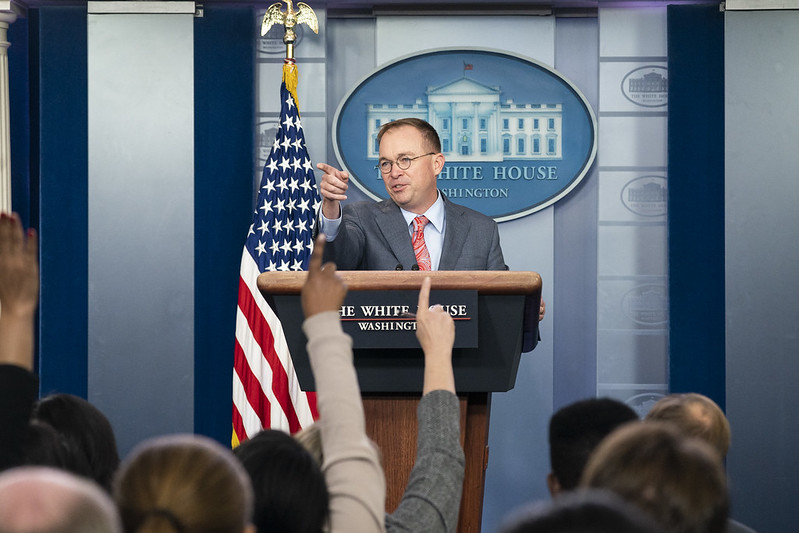More on the Role of OMB in Withholding Ukrainian Aid
Russell Vought, the acting director of the Office of Management and Budget (OMB), announced on Twitter that he and Michael Duffy, an OMB political appointee, are refusing to be deposed by House committees pursuing an impeachment investigation. With this in the news, it is worth revisiting OMB’s delay in releasing nearly $400 million in foreign assistance to Ukraine.

Published by The Lawfare Institute
in Cooperation With

Russell Vought, the acting director of the Office of Management and Budget (OMB), announced on Twitter that he and Michael Duffy, an OMB political appointee, are refusing to be deposed by House committees pursuing an impeachment investigation. With this in the news, it is worth revisiting OMB’s delay in releasing nearly $400 million in foreign assistance to Ukraine.
In a post on Oct. 16, two of us questioned whether OMB satisfied its legal obligations by postponing the release of this assistance ($141 million from the State Department and $250 million from the Defense Department, as noted). We concluded that the answer was unclear. Further investigation suggests that while the withholding of State Department funds likely did not breach OMB’s legal obligations, the White House’s decision to use OMB to hold Defense Department aid appears to have exceeded OMB’s authority.
During an Oct. 17 press conference, acting White House Chief of Staff Mick Mulvaney stated that administration officials withheld the Ukrainian aid, in part, because Trump believed Ukraine was corrupt. Mulvaney argued that Trump did not want to line the pockets of corrupt Ukrainian officials. Mulvaney also added: “Did [Trump] also mention to me in passing the corruption related to the DNC server? Absolutely. No question about that. But that’s it and that’s why we held up the money.”
Mulvaney’s statement regarding the “DNC server” refers to the president's apparent belief in a conspiracy theory that the DNC server hacked by the Russian government in the lead-up to the 2016 election is currently in Ukraine and should be examined. A memorandum summarizing a July 25 call between Ukrainian President Volodymyr Zelensky and Trump indicates that Trump acted on this belief when he asked Zelensky to “find out what happened” with the server.
If Mulvaney’s assertions are accurate, then OMB appears to have withheld the aid for reasons unrelated to the budget—and to have done so without informing Congress. Without assessing the veracity of Mulvaney’s claim, this statement is contrary to what relevant law normally requires. However, in certain cases the executive has pockets of discretion based on how Congress has provided the funding.
Mulvaney alluded to this issue in his press conference when he said:
There was a report that if we didn’t pay out the money it would be illegal, it would be unlawful. That is one of those things that has a little shred of truth in it that makes it look a lot worse than it really is. We were concerned over at OMB about an impoundment[.] … The Budget Control Impoundment Act of 1974 says that if Congress appropriates money you have to spend it. … And we knew that that money either had to go out the door by the end of September or we had to have a really, really good reason not to do it. And that was the legality of the issue.
Mulvaney appears to be asserting that OMB satisfied all of its legal duties in its dealings with the State Department and Defense Department funds. While OMB did release the State Department and Defense Department money around Sept. 11, actions taken prior to this date did not obviously comply with all relevant federal laws.
As two of us discussed on Oct. 16, 31 U.S.C. § 1512 states that OMB must apportion appropriated funds to “prevent obligation or expenditure at a rate that would indicate a necessity for a deficiency or supplemental appropriation for the period.” Under the same statute, the president—or OMB via delegation—can withhold money to create a reserve only in order to prepare for (budgetary) contingencies, achieve savings or meet the parameters of specific funding laws. Creating such a reserve would require notice to Congress pursuant to the 1974 Impoundment Control Act (ICA). Additionally, the ICA mandates that whenever OMB seeks to edit the budget outside of its 31 U.S.C. § 1512 granted powers to otherwise “defer” budget authority—including by “withholding or delaying the obligation or expenditure of budget authority”—the president needs to send a message to Congress explaining why. However, budget authority may only be proposed for deferral under the ICA for the limited purpose of (budgetary) contingencies, achieving savings or meeting the parameters of specific funding laws—but not for policy reasons.
In this instance, the State Department was not required, as a legal matter, to obtain OMB’s approval before submitting a mandated 15-day notification to Congress and releasing the $141 million in aid. From what we understand, in these types of instances, the State Department usually waits for OMB’s informal approval before submitting the required notification to Congress, as a courtesy to the White House. Here, it appears that OMB withheld this informal approval. But during this time, the State Department could have unilaterally sent Congress a notification and released this aid. As a result, the White House likely met its legal obligation with this section of the funds because it was not formally responsible for this delay and OMB did, ultimately, apportion the funds before the fiscal year’s end.
By contrast, it seems OMB was likely using its formal power to delay the release of Defense Department aid. OMB appears to have extended the release timeline on these funds by revising an existing apportionment to add footnotes that effectively made the money legally unavailable until its release sometime around Sept. 11. As the Oct. 16 post pointed out, this apportionment process—including any applicable footnotes—is legally binding and is outlined in section 120 of OMB’s Circular A-11 document. Amb. William Taylor’s testimony revealed that after OMB had placed a hold on the aid, OMB asked the Defense Department to conduct an effectiveness study. The Defense Department completed the study one day after the OMB request and concluded that the aid would be effective. Yet, Taylor’s testimony asserts, OMB continued to hold the aid.
In this instance, if OMB was merely conducting a budget audit to ensure Ukrainian aid was appropriately apportioned, these actions would have been within its mandate. Furthermore, OMB would have had a plausible argument that the ICA, 2 U.S.C. 683(a), allows the office to delay the Defense Department’s aid in order to determine how it should be apportioned.
However, to date, there is no evidence that this was the reason for the delay. Perhaps some such evidence will emerge. But all of the information in the public realm thus far, including what Mulvaney said on Oct. 17, indicates that the reasons for the delay had nothing to do with a budget audit. Instead, the delay concerned, at most, pressure to get the Ukrainians to open an investigation in order to help the president politically, and possible policy concerns about corruption. On our reading of the relevant laws, this is not a valid basis for OMB to delay the release of funds.
On Sept. 27, the president signed into law a seven-week continuing resolution that included a provision extending the availability of the Defense Department’s unspent Ukraine funds. Because the life of the funds was extended, the White House avoided effectively rescinding appropriated funding without Congressional approval—which would have been a blatant impoundment violation under the relevant laws, including the ICA, the 2019 National Defense Authorization Act and the 2019 Appropriations Act. But it appears that OMB did not comply with relevant law when it delayed the release of the Defense Department’s $250 million in aid on grounds unrelated even to the permissible reasons for proposing such a delay under the ICA—budgetary contingencies, savings through greater efficiency or the need to meet the parameters of specific funding laws.
Editor’s note: This piece has been edited to more precisely describe the relevant appropriations law and to note the extension of the availability of the Department of Defense funds through a continuing resolution. Previously, the piece stated that all funds had been legally obligated before the end of the fiscal year.







